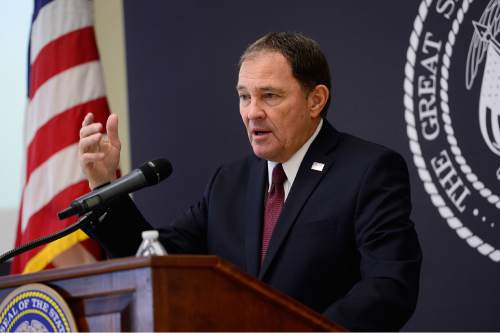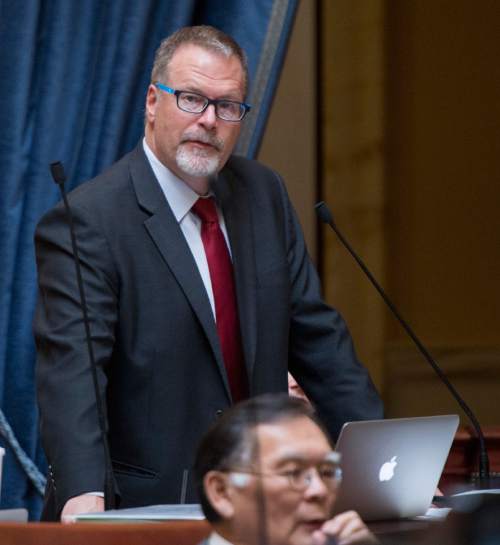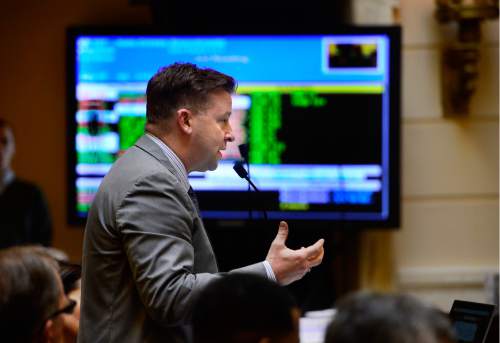This is an archived article that was published on sltrib.com in 2016, and information in the article may be outdated. It is provided only for personal research purposes and may not be reprinted.
Despite a drop-off of support from a preliminary vote, the Senate on Wednesday gave its final approval to a bill that would end capital punishment in future Utah cases.
SB189 passed without a vote to spare, 15-12. (The Senate requires a majority of all 29 members, regardless of how many participate in the vote.) The bill now goes to the House for consideration.
SB189 would eliminate the death penalty as a punishment for first-degree felony murder, effective May 10, and leave life in prison without the possibility of parole, or 25 years to life as the remaining punishments for the crime.
If the bill becomes law, Utah would join 19 other states and the District of Columbia in abolishing the death penalty.
A onetime supporter of capital punishment, SB189 sponsor, Sen. Steve Urquhart, R-St. George, has said he changed his mind about the punishment after evaluating its costs, the emotional toll on victims' families and the roughly 25 years it takes for Utah's condemned to get from conviction to execution.
"We have the reality of the death penalty, which is a significant contradiction to the theoretical death penalty," he said just before the vote. "The reality of the death penalty in Utah, it does not work."
Urquhart later said there is no question in his mind about how the bill will fare in the House: "We're gonna pass it."
But the bill could face a potential veto from Gov. Gary Herbert, who told reporters Tuesday that he supports retaining the death penalty.
"Capital punishment, if we have it here in Utah, ought to be done for the most heinous crimes. It ought to be infrequent and that's really how we've approached the death penalty in Utah," Herbert said. "I think that's where Utah is at and I think how we've done it has been good. I think, for me, the concern I have is really the lack of timeliness from the time we have someone charged to the time they're convicted and executed."
Herbert's spokesman, Jon Cox, said Wednesday that the governor has not decided yet whether he would veto the repeal if it arrives on his desk.
Recent polls have indicated broad public support for the death penalty in the state, with 69 percent of Utahns approving of the penalty in a Salt Lake Tribune/Hinckley Institute of Politics poll in early January. Only 19 percent disapproved and 12 percent were unsure.
Wednesday's vote came less than 24 hours after senators first debated the measure and opposition to the proposal — which first passed on a 20-9 vote without debate — grew overnight.
Sen. Todd Weiler, R-Woods Cross, said he believes the calculations in a 2012 study — which found state and local governments spend roughly $1.6 million more for each death row inmate — are false and underestimate the cost of keeping an inmate in prison for the rest of their natural life.
Those expenses, Weiler said, include court appeals of the lifetime prison sentences, higher security costs and the price of geriatric health care for aging inmates.
Weiler also said the root of Utah's death-penalty problem lies in its handling of appeals. In Virginia, he noted, condemned persons spend an average of only seven years on death row following a conviction.
"We should duplicate Virginia's protocols," Weiler said. "We have a case-management problem."
Sen. Lyle Hillyard, R-Logan, joined Weiler in opposing the bill, saying his primary concern was for the families of slain victims. Hillyard said those families should have the right to choose what type of punishment the convicted face.
"There are victims for whom this process becomes very important," he said. "It should be the victim's family's choice, not ours."
Hillyard, an attorney, also said prosecutors need to be able to use the threat of capital punishment as a tool for getting accused killers to plead guilty and fess up to the details of their crimes.
"Having the death penalty on the table gives all sorts of negotiating powers to the prosecution," he said.
SB189 would have no effect on any capital cases already underway, nor would it stop Utah from carrying out the executions of the nine men currently on the state's death row.
"I want to be very sensitive to the families who are in this situation," Urquhart said. "They have their expectations set and I don't want to disrupt those expectations."







